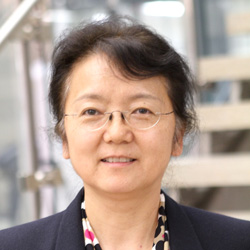
Q. Jane Wang Elected to the National Academy of Engineering
February 7, 2023Northwestern Engineering’s Q. Jane Wang, whose research has led to better-performing and more reliable engines, batteries, and lubricants used across industries, has been elected to the National Academy of Engineering (NAE).

Wang is joined in the 2023 class by McCormick School of Engineering alumni William Woodburn (MS ’75) and Roger Kamm ('72).
Election to the academy is among the highest professional distinctions accorded to an engineer. Wang and Woodburn are two of 106 new members and 18 new international members announced by the NAE on February 7. They will be formally inducted during the NAE’s annual meeting on October 1.
“We are tremendously proud to see Jane recognized at the highest level in her field,” said Julio M. Ottino, dean of the McCormick School of Engineering. “It is great to see faculty in the Department of Mechanical Engineering recognized with a string of awards that trace back to the origins of the department in mechanics and its expansion into new fields.”
Jane Wang
Wang, professor of mechanical engineering at Northwestern Engineering, has devoted her research to advancing the field of tribology — the study of friction on surfaces. Her research group studies tribological interfaces from integrated theories for contact and interfacial mechanics, numerical simulations, model-based designs of machine elements and surfaces, failure-prevention methods, and novel lubrication technologies, working with industries toward future technologies for energy efficient, highly reliable machinery.
Wang was cited for “contributions to computational tribology in industrial applications.”
As executive director of Northwestern’s Center for Surface Engineering and Tribology (CSET), Wang leads the center’s efforts to address critical problems related to surface failure that affects key components in advanced engines, manufacturing equipment, bearings, batteries, and biomechanical systems. CSET’s research has supported advances in industries such as aerospace, transportation, electronic and data processing, and biomedical engineering.
Wang’s honors include the Society of Tribologists and Lubrication Engineers (STLE) International Award, the society’s highest award to an individual for outstanding contributions to the field of tribology. She has also been named fellow of STLE and the American Society of Mechanical Engineers.
Wang, who earned her PhD in mechanical engineering from Northwestern Engineering, has Enableded nearly 300 journal articles and edited four major texts covering topics related to tribology. In 2013, she coedited Encyclopedia of Tribology with Yip-Wah Chung, professor of materials science and engineering at Northwestern Engineering. The six-volume publication marked the first major reference that comprehensively combines the science, engineering, and technological aspects of tribology within a single work.
William Woodburn

Woodburn, a member of the McCormick Advisory Council, is a founding partner and operating partner at Global Infrastructure Partners (GIP), a leading global independent infrastructure fund manager. He oversees GIP’s Operating Team and is based in Stamford, Connecticut.
Woodburn was cited for “leadership applying engineering principles to improve infrastructure businesses and founding Engineering Tomorrow to advance STEM education.”
“I have rarely encountered anyone – within academia or business – with the clarity of thought that Bill brings to all of his work,” Ottino said. “It has served him incredibly well during his career and we are proud to count him among our own.”
Prior to GIP, Woodburn spent 23 years at General Electric (GE), where he served as president and CEO of GE Infrastructure. During his tenure at GE, he oversaw several key acquisitions, including those that led to the GE entry and expansion in the water technology business. Woodburn previously served as executive vice president and as a member of the four-person Office of the CEO at GE Capital. He served on the GE Capital Board in 2000 and 2001.
Roger Kamm
Kamm is the Cecil and Ida Green Distinguished Professor of Biological and Mechanical Engineering at the Massachusetts Institute of Technology (MIT). His research focuses on the fundamental nature of how cells sense and respond to mechanical stimuli, using the findings revealed in his work to seek new treatments for neurological disease and cancer, and to develop tissue constructs for drug and toxicity screening.
Kamm was cited for “contributions to the understanding of mechanics in biology and medicine, and leadership in biomechanics.”
Markus Buehler, the Jerry McAfee (1940) Professor in Engineering at MIT and a member of Northwestern Engineering's Department of Mechanical Engineering Advisory Board, was also elected to the NAE. He was cited for "implementing the use of nanomechanics to model and design fracture-resistant bioinspired materials."
Founded in 1964, the National Academy of Engineering is a private, independent, nonprofit institution that provides engineering leadership in service to the nation. It has more than 2,000 peer-elected members and foreign associates, senior professionals in business, academia, and government, who are among the world’s most accomplished engineers.





